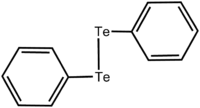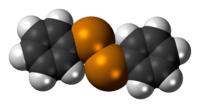Diphenyl ditelluride
 | |
 | |
| Names | |
|---|---|
| IUPAC name
Diphenylditelluide | |
| Other names
Phenylditelluride | |
| Identifiers | |
| 32294-60-3 | |
| 3D model (Jmol) | Interactive image Interactive image |
| ChemSpider | 90943 |
| ECHA InfoCard | 100.046.332 |
| PubChem | 100657 |
| |
| |
| Properties | |
| C12H10Te2 | |
| Molar mass | 409.42 g/mol |
| Appearance | Orange powder |
| Density | 2.23 g/cm3 |
| Melting point | 66 to 67 °C (151 to 153 °F; 339 to 340 K) |
| Boiling point | decomposes |
| Insoluble | |
| Solubility in other solvents | Dichloromethane |
| Structure | |
| 90° at Se C2 symmetry | |
| 0 D | |
| Hazards | |
| Main hazards | Toxic |
| R-phrases | 20/21/22-36/37/38 |
| S-phrases | 26-36 |
| Related compounds | |
| Related compounds |
Ph2S2, Ph2Se2 |
| Except where otherwise noted, data are given for materials in their standard state (at 25 °C [77 °F], 100 kPa). | |
| | |
| Infobox references | |
Diphenylditelluride is the chemical compound with the formula (C6H5Te)2, abbreviated Ph2Te2 This orange-coloured solid is the oxidized derivative of the unstable benzenetellurol, PhTeH. Ph2Te2 is used as a source of the PhTe unit in organic synthesis.
Preparation
Ph2Te2 is prepared by the oxidation of tellurophenolate, which is generated via the Grignard reagent:[1]
- PhMgBr + Te → PhTeMgBr
- 2PhTeMgBr + 0.5 O2 + H2O → Ph2Te2 + 2 MgBr(OH)
The molecule has C2 symmetry.
References
- ↑ Crich, D.; Yao, Q. "Diphenyl Ditelluride" in Encyclopedia of Reagents for Organic Synthesis (Ed: L. Paquette) 2004, J. Wiley & Sons, New York. doi:10.1002/047084289.
This article is issued from Wikipedia - version of the 11/1/2015. The text is available under the Creative Commons Attribution/Share Alike but additional terms may apply for the media files.